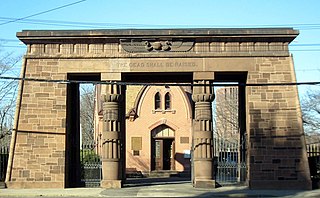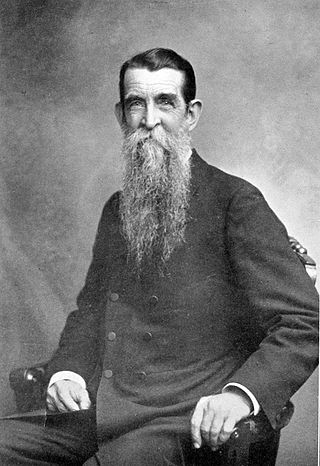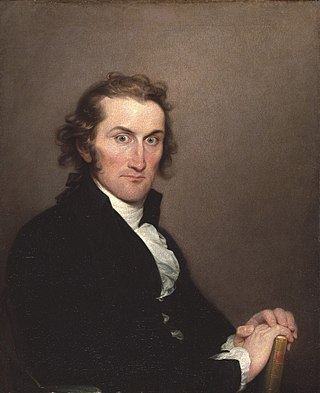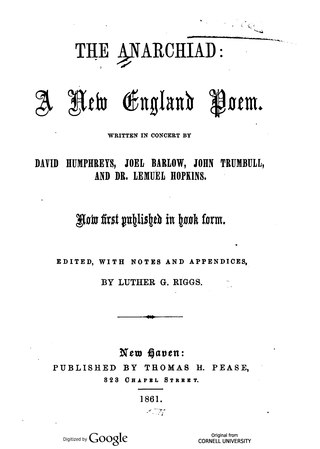Related Research Articles

Israel Putnam, popularly known as "Old Put", was an American military officer and landowner who fought with distinction at the Battle of Bunker Hill during the American Revolutionary War (1775–1783). He also served as an officer with Rogers' Rangers during the French and Indian War (1754–1763), when he was captured by Mohawk warriors. He was saved from the ritual burning given to enemies by the intervention of a French officer with whom the Mohawk were allied. Putnam's courage and fighting spirit became known far beyond his home of Connecticut's borders through the circulation of folk legends in the American colonies and states celebrating his exploits.

Timothy Dwight was an American academic and educator, a Congregationalist minister, theologian, and author. He was the eighth president of Yale College (1795–1817).

Joel Barlow was an American poet, diplomat, and politician. In politics, he supported the French Revolution and was an ardent Jeffersonian republican.

Jonathan Trumbull Sr. was an American politician and statesman who served as Governor of Connecticut during the American Revolution. Trumbull and Nicholas Cooke of Rhode Island were the only men to serve as governor of both a British colony and an American state, and he was the only governor to take up the Patriot cause at the start of the Revolutionary War. Trumbull College at Yale University, the town of Trumbull, Connecticut, Trumbull County, Ohio, and Jonathan the Husky are all named for him.

Grove Street Cemetery or Grove Street Burial Ground is a cemetery in New Haven, Connecticut, that is surrounded by the Yale University campus. It was organized in 1796 as the New Haven Burying Ground and incorporated in October 1797 to replace the crowded burial ground on the New Haven Green. The first private, nonprofit cemetery in the world, it was one of the earliest burial grounds to have a planned layout, with plots permanently owned by individual families, a structured arrangement of ornamental plantings, and paved and named streets and avenues. By introducing ideas like permanent memorials and the sanctity of the deceased body, the cemetery became "a real turning point... a whole redefinition of how people viewed death and dying", according to historian Peter Dobkin Hall. Many notable Yale and New Haven luminaries are buried in the Grove Street Cemetery, including 14 Yale presidents; nevertheless, it was not restricted to members of the upper class, and was open to all.

David Humphreys was an American Revolutionary War colonel and aide de camp to George Washington, a secretary and intelligence agent for Benjamin Franklin in Paris, American minister to Portugal and then to Spain, entrepreneur who brought Merino sheep to America, and member of the Connecticut state legislature. He also was a prolific poet and author and a member of the Hartford Wits. As speechwriter to George Washington during his administration, Humphreys was the nation's first U.S. presidential speechwriter.

Epaphroditus Champion was an American politician and military officer from Connecticut. He served as a U.S. Representative from Connecticut.

John Trumbull was an American poet.

Henry Clay Trumbull was an American clergyman and author. He became a world-famous editor, author, and pioneer of the Sunday School Movement.
Nationality words link to articles with information on the nation's poetry or literature.
Nationality words link to articles with information on the nation's poetry or literature.
Nationality words link to articles with information on the nation's poetry or literature.
Nationality words link to articles with information on the nation's poetry or literature.
Nationality words link to articles with information on the nation's poetry or literature.
Nationality words link to articles with information on the nation's poetry or literature.
Now the Assembly [the Kit-Kat Club] to adjourn prepar'd,
When Bibliopolo from behind appear'd
As well describ'd by th' old Satyrick Bard,
With leering Looks, Bull-fac'd, and Freckled fair,
With two left Legs; and Judas-colour'd [red] Hair,
With Frowzy Pores, that taint the ambient Air.
Sweating and Puffing for a-while he stood.
And then broke forth in this insulting Mood:Without my Stamp in vain your Poets write.
Those only purchase everliving Fame,That in my Miscellany plant their Name.
The Hasty-Pudding is a mock-heroic poem by Joel Barlow. First published in 1796 in The New-York Magazine, it is now commonly anthologized.
John Ely was a Connecticut surgeon and Colonel in the American Revolution.

Lemuel Hopkins was an American poet and physician who was a member of the Hartford Wits, a group of literary satirists active in the late eighteenth century. A politically conservative Federalist, he coauthored The Anarchiad (1786–1787), a lengthy satiric poem critical of popular democracy and of the Articles of Confederation. His fellow authors on the poem were three other leading Wits: David Humphreys, Joel Barlow, and John Trumbull. Hopkins practiced medicine in Litchfield and Hartford and received an honorary Master of Arts degree from Yale University in 1784.
Elihu Hubbard Smith was an American author, physician, and man of letters.

The Anarchiad (1786–87) is an American mock-epic poem that reflected Federalist concerns during the formation of the United States. The Anarchiad, or American Antiquities: A Poem on the Restoration of Chaos and Substantial Night was penned by four members of the Hartford Wits: David Humphreys, John Trumbull, Joel Barlow, and Lemuel Hopkins. It was serialized in 12 parts in The New Haven Gazette and Connecticut Magazine between October 26, 1786 and September 13, 1787.
References
- 1 2 3 "The Hartford Wits | ConnecticutHistory.org". connecticuthistory.org. Retrieved 2017-11-20.
- ↑ Saillant, John. "Hartford Wits." Dictionary of American History. Ed. Stanley I. Kutler. 3rd ed. Vol. 4. New York: Charles Scribner's Sons, 2003. 101-102. Gale Virtual Reference Library. Web. 7 May 2012.
- ↑ "Columbia. Timothy Dwight (1752-1817). I. Patriotism. Bliss Carman, et al., eds. 1904. The World's Best Poetry. VIII. National Spirit". www.bartleby.com. Retrieved 2017-11-20.
- ↑ "Poetry: The Connecticut Wits." American Eras. Vol. 4: Development of a Nation, 1783-1815. Detroit: Gale, 1997. 59-61. Gale Virtual Reference Library. Web. 7 May 2012
- ↑ Stanley L., Block (2000). "Smith, Elihu Hubbard (1771-1798)" . American National Biography. doi:10.1093/anb/9780198606697.article.1200856. ISBN 978-0-19-860669-7 . Retrieved 2022-01-29.